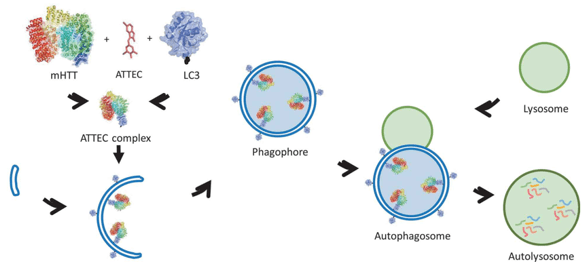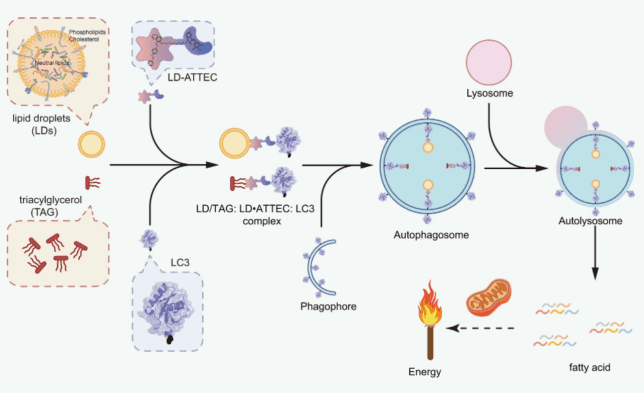As a leading provider of drug discovery and research services, BOC Sciences is committed to providing a one-stop services for the development of targeted protein degraders. ATTEC, a novel small molecule degrader that harnesses an important intracellular protein degradation pathway, macroautophagy, to control levels of disease related proteins. With a comprehensive and advanced platform, we provide ATTEC design, synthesis, optimization and assay services to our global customers to achieve new drug discovery goals.
Introduction
Many diseases are caused by the abnormal accumulation of certain misfolded and cytotoxic proteins, and reducing the levels of these proteins offers promising therapeutic strategies for these diseases. Although PROTACs provide promising therapeutic strategies for degrading pathogenic proteins using the ubiquitin-proteasome degradation systems, some disease-causing protein aggregates or non-protein disease-causing biomolecules may not be effectively degraded by the proteasome. The lysosomal degradation system as another important intracellular degradation pathway has expanded the research horizon in the field of targeted protein degradation.
The autophagy-lysosome pathway is the major degradation pathway that occurs in all eukaryotic cells. Autophagy is a cellular process in which the cytoplasmic contents are degraded within lysosomes/vesicles and the resulting macromolecular components are recycled. Macroautophagy is an autophagic process in which substrates are isolated in cytosolic double-membrane vesicles called autophagosomes.
ATTEC (autophagosome-tethering compound) is able to interact with the phagophore protein LC3 (It can be lipidated to form autophagosome) and protein substrates to bind the target protein to the phagocyte for subsequent autophagic degradation. There is evidence that autophagic protein substrates are engulfed in double-membrane phagocytes associated with lipidated LC3 proteins.
 Fig 1. Mechanism of action of ATTEC (Li, 2020)
Fig 1. Mechanism of action of ATTEC (Li, 2020)
Applications of ATTEC
ATTEC can be applied to many disease-causing proteins or other biomolecules to treat diseases.
- ATTECs link protein of interest (POI) to autophagosomes by directly binding POI and the key autophagosome-associated protein LC3. Mutant HTT proteins (mHTT) cause Huntington's disease (HD), an incurable monogenic neurodegenerative disorder. ATTECs can target mHTT to autophagosomes selectively for subsequent degradation without affecting wild-type HTT.
- ATTECs can be designed to target lipid droplets (LDs) that are ubiquitous lipid-storing cellular structures. Abnormal accumulation of LD is associated with many diseases such as obesity, cardiovascular disease, and neurodegenerative disease. It has been recently reported that ATTEC has successfully targeted LDs and rescued LD-related phenotypes in cells and two independent mouse models of hepatic lipid deposition.
 Fig 2. Mechanism of action of ATTEC-mediated lipid degradation (Fu, 2021)
Fig 2. Mechanism of action of ATTEC-mediated lipid degradation (Fu, 2021)
Outstanding Features of ATTEC
- Compared to PROTAC technology, ATTEC does not require the ubiquitination pathway to mediate degradation, and therefore does not present challenges such as inadequate proteasome and targeting E3 ligase leading to drug resistance.
- ATTEC molecules do not require the intervention of linkers, have lower molecular weight and good membrane penetrating activity, which can better meet the requirements of pharmacokinetics and other requirements, and thus may have better drug properties.
Our Advantages
- Innovative ATTEC technology development
- Quality one-stop service
- Experienced experts team and extensive expertise
- Data analysis, detailed report with results and discussion
- Highly reliable and reproducible result
- Short turn-around time and competitive price
Our Services
BOC Sciences provides lysosomal-based ATTEC development services. Our one-stop services include but not limited to:
- Innovative ATTEC design and synthesis
- Small molecule screening by virtual screening technique
- ATTEC in vitro evaluation
- ATTEC in vivo evaluation
- Chemical modifications to improve the properties of drug molecules
Project Workflow

References:
- Fu, Y., et al. Degradation of lipid droplets by chimeric autophagy-tethering compounds, Cell Research, 2021, 31, 965-979.
- Li, Z., et al. ATTEC: a potential new approach to target proteinopathies, Autophagy, 2020, 16, 185-187.
- Feng, Y., et al. The machinery of macroautophagy, Cell Research, 2014, 24, 24-41.

 Fig 1. Mechanism of action of ATTEC (Li, 2020)
Fig 1. Mechanism of action of ATTEC (Li, 2020) Fig 2. Mechanism of action of ATTEC-mediated lipid degradation (Fu, 2021)
Fig 2. Mechanism of action of ATTEC-mediated lipid degradation (Fu, 2021)
